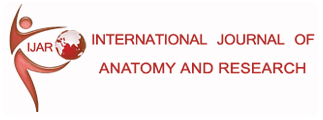IJAR.2019.231
Type of Article: Case Report
Volume 7; Issue 3.1 (July 2019)
Page No.: 6790-6792
DOI: https://dx.doi.org/10.16965/ijar.2019.231
AUTOPSY FINDINGS OF DICEPHALIC DIBRACHIUS PARAPAGUS CONJOINED TWINS: A CASE REPORT
Ato Ampomah Brown *1, Leonard Derkyi-Kwarteng 2, Emmanuel Okai 3, Kafui Akakpo 2.
*1 Department of Anatomy, School of Medical Sciences, University of Cape Coast, Ghana.
2 Department of Pathology, School of Medical Sciences, University of Cape Coast, Ghana.
3 Department of Paediatrics, School of Medical Sciences, University of Cape Coast, Ghana.
Corresponding Author: AtoAmpomah Brown, University of Cape Coast, School of Medical Sciences, Department of Anatomy, Cape Coast, Ghana. Tel +233244648027 E-Mail: a.a.brown@uccsms.edu.gh
ABSTRACT:
This is a case report of a set of dicephalic parapagus twin delivered by caesarean section and who survived for 22 days postpartum. At autopsy each twin was found to have a separate upper gastrointestinal tract which eventually became shared in the mid gut region. Their vertebral columns ran side by side and also fused at the level of the lumbo-sacral region. Each twin possessed a pair of lungs but they shared a single fused heart. A complex cardiopulmonary system was identified which had the potential to support both twins.
Key words: Autopsy, Twins, Conjoined.
REFERENCES
- Mutchinick OM, Luna-Muñoz L, Amar E, Bakker MK, Clementi M, Cocchi G, et al. Conjoined twins: a worldwide collaborative epidemiological study of the International Clearinghouse for Birth Defects Surveillance and Research. Am J Med Genet C Semin Med Genet. 2011; 157C (4):274-87.
- Hari S, Sharma R, Gupta AK, Das C, Singal AK. Magnetic resonance imaging of parapagus twins. Eur J Radiol 2004; 51: 25-29.
- Kaveh M, Kamrani, K, Naseri M, Danaeian M, Asadi F, Davari-Tanha F. Dicephalicparapagustribrachius conjoined twins in a triplet pregnancy: a case report. J Family Reprod Health 2014; 8:83.
- Karaer A, Tanrıkulu İ, Güneş N, Çakır E, Öztaş A. Parapagusdicephalusdibrachusdipus: a case of conjoined twins. J Turk GerGynecolAssoc 2009; 10:241.
- Martinez- Frias ML, Bermejo E, Mendioroz J, Rodriguez- Pinilla E, Blanco M, Egües J, Felix V, Garcia A, Huertas H, Nieto C, Lopez JA, Lopez S, Paisan L, Rosa A, Vazquez MS. Epidemiological and clinical analysis of a consecutive series of conjoined twins in Spain. J PediatrSurg 2009; 44: 811-820.
- Kaufman MH. The embryology of conjoined twins. Child NervSyst 2004; 20: 508-525.
- Barth RA, Filly RA, Goldberg JD, Moore P, Silverman NH. Conjoined twins: prenatal diagnosis and assessment of associated malformations. Radiology 1990; 177: 201-207.
- Spencer R. Theoretical and analytical embryology of conjoined twins: part I: embryogenesis. 2000 ClinlAnat; 13: 36-53.
- Harma, M, Harma M, Mi Z, Oksuzler C. Vaginal delivery of dicephalicparapagus conjoined twins: case report and literature review. Tohoku J Exp Med 2005; 205:179-185.
- Singhal, AK, Agarwal GS, Sharma S, Gupta AK, Gupta DK. Parapagus conjoined twins: complicated anatomy precludes separation. Journal of Indian Association of Pediatric Surgeons 2006; 11:145.
- Groner JI, Teske DW, Teich S. Dicephalusdipusdibrachius: an unusual case of conjoined twins. J PediatrSurg 1996; 31:1698-1700.








